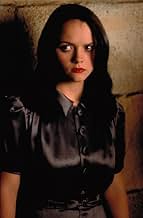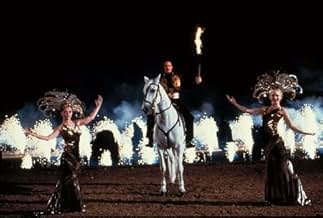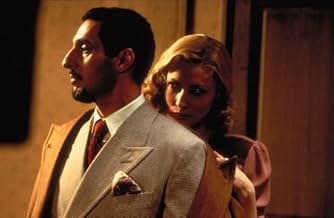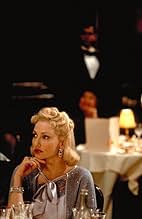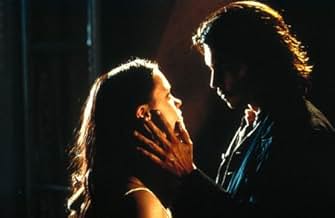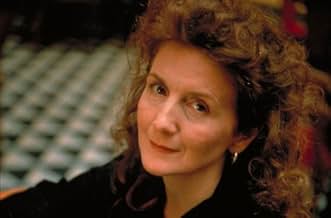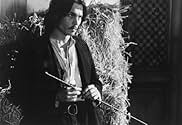NOTE IMDb
6,1/10
17 k
MA NOTE
Une jeune réfugiée relie la Russie à l'Amérique pour rechercher son père disparu. En chemin, elle tombe amoureuse d'un cavalier gitan.Une jeune réfugiée relie la Russie à l'Amérique pour rechercher son père disparu. En chemin, elle tombe amoureuse d'un cavalier gitan.Une jeune réfugiée relie la Russie à l'Amérique pour rechercher son père disparu. En chemin, elle tombe amoureuse d'un cavalier gitan.
- Réalisation
- Scénario
- Casting principal
- Récompenses
- 3 victoires et 3 nominations au total
Avis à la une
Under the yoke of persecution, people-- collectively or individually-- will find a voice, a way to communicate their plight to the world, to anyone who will listen. Sometimes the whole world will hear that cry, but often it will fall on deaf ears. `The Man Who Cried,' written and directed by Sally Potter, is just such a story, of a people-- Jews-- unimaginably persecuted and attempting to find their voice, that common expression of their suffering and turmoil. And, as is wont to happen in extreme situations, that expression will manifest itself in terms that are universal and defy the barriers of language. The `Man' in this story can be found in hu-MAN-ity, and his cry can be found in the common expression of song: In the aria of the opera, in the songs of the gypsies camping on the outskirts of Paris, or in the a capella intonations of a young Russia girl, a Jew, exiled from her home and adrift, alone, in a world of incomprehensible confusion.
The story begins in Russia, 1927; a man (Oleg Yankovsky) is forced to flee the country for America, leaving behind his young daughter, for whom he hopes to send later, once he is settled. Very soon, however, the preadolescent girl is forced to leave, as well, and winds up alone in England, at a school, where she is given the name `Suzie,' and, being an outsider, suffers the taunts of her peers. And through it all, what keeps Suzie (Christina Ricci) going, is the thought that some day she will be able to join her father (from whom she has not heard since his departure from Russia) in America. In the meantime, Suzie finds solace in singing, while her personal odyssey eventually takes her to Paris (at a most inopportune time for a Jew), where she becomes involved with a dancer named Lola (Cate Blanchett), a renowned opera singer, Dante Dominio (John Turturro) and an enigmatic gypsy, Cesar (Johnny Depp). Now a young woman, Suzie's dreams of America have diminished somewhat, but as the Nazi war machine begins cutting a swath across Europe, her thoughts, with renewed fervor, yet mingled with doubt, turn again to the possibility of joining her father in America.
As with her previous effort, `Orlando,' in 1993, Sally Potter had a definite vision of how to approach and present her story. Unfortunately, she seems unable-- or unwilling-- to share that vision with her audience. The story itself is interesting, if not original, but her disjointed, abstract methods of presenting it make it too obscure to embrace. On the surface, what some may initially consider an imaginative rendering of the material dissolves under closer scrutiny, and the artistic, abstract presentation is revealed as nothing more nor less than the effects of awkward transitions that defeat the very vision Potter was attempting with this film. The `transitions,' in fact, which are so vital to the telling of the story, are actually not so much transitions as they are lurches or jumps, which dramatically distorts the flow of the film. Add to that the lack of character development or delineation, as well as Potter's inability to maintain any tension whatsoever, and the result is a film that is emotionally uninvolving and, at best, unapproachable from the standpoint of the audience. Visually, it has it's moments, especially in the silent exchanges between Suzie and Cesar, but they are simply too few and far between to sustain any interest. And it's unfortunate, because Potter had all the tools with which to work, but didn't know what to do with them.
The performances, too, suffer the same fate as the presentation of the film. Ricci looks stunning-- very reminiscent of a young Elizabeth Taylor, in fact-- and her performance is the highlight of the film; Suzie, at least, is believable. Ricci does well with the material she is given-- which isn't much-- and her lack of dialogue and extended moments of silence may mask, somewhat, the ambiguity of the character. She is wonderfully expressive, however, which at least adds a touch of mystery to Suzie, who because of Potter's lack of attention is not nearly as sympathetic a character as she should be. Ricci has developed a powerful screen presence, quite apparent though unemployed in this film, and hopefully in her next project she will have a director who knows how to use it.
Like Ricci, Cate Blanchett does the best she can with the material, but under Potter's unsteady hand Lola seems out of step with her environment, and despite Blanchett's best efforts comes across as more caricature than character. She certainly tried, however, and attempted to get more out of Lola than was humanly possible. A poorly written stereotype, there was nothing Blanchett could do to save herself, or the character, with this one.
John Turturro suffers the same fate, only more so. Without the necessary guidance, he seems to have a hard time immersing himself into Dante's skin. It's a good effort, but Turturro as Dante is like putting a square peg in a round hole; he just doesn't fit. And the singing voice provided for him defies credibility.
Depp, as well, seems at odds with his character, Cesar, though he suits the part of the silent, brooding gypsy quite well. Again, it's a case of being all dressed up with nowhere to go. The character was not so much poorly written as too ambiguous; to be effective (as he could and should have been), Cesar simply needed some direction, and it was not there.
The supporting cast includes Harry Dean Stanton (Perlman), Hana Maria Pravda (Grandmother) and Claudia Lander-Duke as young Suzie (the best bit of casting in the film; very credible as a young Ricci). The most positive thing that can be said of `The Man Who Cried' is that it had such potential. Alas, it was never tapped; and you're left with the thought of what could have been. I rate this one 4/10.
The story begins in Russia, 1927; a man (Oleg Yankovsky) is forced to flee the country for America, leaving behind his young daughter, for whom he hopes to send later, once he is settled. Very soon, however, the preadolescent girl is forced to leave, as well, and winds up alone in England, at a school, where she is given the name `Suzie,' and, being an outsider, suffers the taunts of her peers. And through it all, what keeps Suzie (Christina Ricci) going, is the thought that some day she will be able to join her father (from whom she has not heard since his departure from Russia) in America. In the meantime, Suzie finds solace in singing, while her personal odyssey eventually takes her to Paris (at a most inopportune time for a Jew), where she becomes involved with a dancer named Lola (Cate Blanchett), a renowned opera singer, Dante Dominio (John Turturro) and an enigmatic gypsy, Cesar (Johnny Depp). Now a young woman, Suzie's dreams of America have diminished somewhat, but as the Nazi war machine begins cutting a swath across Europe, her thoughts, with renewed fervor, yet mingled with doubt, turn again to the possibility of joining her father in America.
As with her previous effort, `Orlando,' in 1993, Sally Potter had a definite vision of how to approach and present her story. Unfortunately, she seems unable-- or unwilling-- to share that vision with her audience. The story itself is interesting, if not original, but her disjointed, abstract methods of presenting it make it too obscure to embrace. On the surface, what some may initially consider an imaginative rendering of the material dissolves under closer scrutiny, and the artistic, abstract presentation is revealed as nothing more nor less than the effects of awkward transitions that defeat the very vision Potter was attempting with this film. The `transitions,' in fact, which are so vital to the telling of the story, are actually not so much transitions as they are lurches or jumps, which dramatically distorts the flow of the film. Add to that the lack of character development or delineation, as well as Potter's inability to maintain any tension whatsoever, and the result is a film that is emotionally uninvolving and, at best, unapproachable from the standpoint of the audience. Visually, it has it's moments, especially in the silent exchanges between Suzie and Cesar, but they are simply too few and far between to sustain any interest. And it's unfortunate, because Potter had all the tools with which to work, but didn't know what to do with them.
The performances, too, suffer the same fate as the presentation of the film. Ricci looks stunning-- very reminiscent of a young Elizabeth Taylor, in fact-- and her performance is the highlight of the film; Suzie, at least, is believable. Ricci does well with the material she is given-- which isn't much-- and her lack of dialogue and extended moments of silence may mask, somewhat, the ambiguity of the character. She is wonderfully expressive, however, which at least adds a touch of mystery to Suzie, who because of Potter's lack of attention is not nearly as sympathetic a character as she should be. Ricci has developed a powerful screen presence, quite apparent though unemployed in this film, and hopefully in her next project she will have a director who knows how to use it.
Like Ricci, Cate Blanchett does the best she can with the material, but under Potter's unsteady hand Lola seems out of step with her environment, and despite Blanchett's best efforts comes across as more caricature than character. She certainly tried, however, and attempted to get more out of Lola than was humanly possible. A poorly written stereotype, there was nothing Blanchett could do to save herself, or the character, with this one.
John Turturro suffers the same fate, only more so. Without the necessary guidance, he seems to have a hard time immersing himself into Dante's skin. It's a good effort, but Turturro as Dante is like putting a square peg in a round hole; he just doesn't fit. And the singing voice provided for him defies credibility.
Depp, as well, seems at odds with his character, Cesar, though he suits the part of the silent, brooding gypsy quite well. Again, it's a case of being all dressed up with nowhere to go. The character was not so much poorly written as too ambiguous; to be effective (as he could and should have been), Cesar simply needed some direction, and it was not there.
The supporting cast includes Harry Dean Stanton (Perlman), Hana Maria Pravda (Grandmother) and Claudia Lander-Duke as young Suzie (the best bit of casting in the film; very credible as a young Ricci). The most positive thing that can be said of `The Man Who Cried' is that it had such potential. Alas, it was never tapped; and you're left with the thought of what could have been. I rate this one 4/10.
First of all, try to avoid the trailer before watching the movie if you can. The Man Who Cried is about a young Jewish girl living in Russia in the late twenties who has to flee her home country and eventually ends up in Paris as a young adult just before the onset of World War II. She gets involved with a cabaret showgirl played by Cate Blanchett, an Italian opera singer played by John Turturro and a gypsy man played by Johnny Depp. I found the movie slow-moving but not boring. It had a certain melancholy to it where almost everything was restrained and understated. There are dramatic moments but no big melodrama which honestly I kinda missed. I wasn't particularly touched nor did I cry or even get teary-eyed. Your own mileage might vary, but I don't think it's a big tear-jerker.
There's a lot of music (mostly opera but not usually the bombastic cliché kind) in this film with two important recurring songs. They're quite beautiful especially the french song "Je crois entendre encore" which weirdly I didn't recognize as French despite it being my native language. The songs are important because they often convey the emotions felt instead of words. It doesn't really matter that you don't understand the words. As an historical drama, it mostly skirts big events, mostly focusing on their effects on our characters from different nationalities. You need some minimal historical background to get what is happening. The whole first part with the exile of the little girl was pretty gripping. She seemed so small and vulnerable. The romantic aspect was two-fold. The relationship between Cate Blanchett and John Turturro's characters was very interesting but not romantic. The relationship between Christina Ricci and Johnny Depp's characters was less interesting but more romantic.
Johnny Depp doesn't say much but his presence is felt. He was born to play sexy gypsy men and I suspect most women will "swoon" over him ;) The other performances were fine with the stand-out being Cate Blanchett as a somewhat superficial Russian dancer trying to marry into richness. The songs were mostly lip-synched. I think they were done very well but still it disturbed somewhat my suspension of disbelief. In conclusion, I liked watching it, it was well made with strong actors but the story could have been told a little better to engage the viewer more emotionally. It didn't strike me as particularly memorable or as the highlight of any of these actor's resumes.
Rating: 6.5 out of 10 (good)
There's a lot of music (mostly opera but not usually the bombastic cliché kind) in this film with two important recurring songs. They're quite beautiful especially the french song "Je crois entendre encore" which weirdly I didn't recognize as French despite it being my native language. The songs are important because they often convey the emotions felt instead of words. It doesn't really matter that you don't understand the words. As an historical drama, it mostly skirts big events, mostly focusing on their effects on our characters from different nationalities. You need some minimal historical background to get what is happening. The whole first part with the exile of the little girl was pretty gripping. She seemed so small and vulnerable. The romantic aspect was two-fold. The relationship between Cate Blanchett and John Turturro's characters was very interesting but not romantic. The relationship between Christina Ricci and Johnny Depp's characters was less interesting but more romantic.
Johnny Depp doesn't say much but his presence is felt. He was born to play sexy gypsy men and I suspect most women will "swoon" over him ;) The other performances were fine with the stand-out being Cate Blanchett as a somewhat superficial Russian dancer trying to marry into richness. The songs were mostly lip-synched. I think they were done very well but still it disturbed somewhat my suspension of disbelief. In conclusion, I liked watching it, it was well made with strong actors but the story could have been told a little better to engage the viewer more emotionally. It didn't strike me as particularly memorable or as the highlight of any of these actor's resumes.
Rating: 6.5 out of 10 (good)
My entire reason for bringing this film home was the cast: Christina Ricci, Cate Blanchett, John Turturro and Johnny Depp. Each of the actors are phenomenal and have talent in spades, and to see them all together in a film with such great characters was a delight. However, this is one of those movies where there is no fast-paced, witty dialog, no car chases and no gratuitous sex. It is about the characters. Therefore, many will find its plot slow and dull. This movie was not made for mass appeal. Many will find it to be beautiful and meaningful, while others will not sit through the first half hour. With that said, I will now say how much I loved this movie. It was visually stunning, superbly acted and has a score to match. While I have always enjoyed Christina Ricci and found her to be quite attractive, I have never seen her look as beautiful as she does in this film. Cate Blanchett is as wonderful as she always is, proving once more she is one of today's most versatile and convincing actors. Johnny Depp and John Turturro are also both excellent in their roles. Overall, I would have to recommend this to anyone who enjoys good character development/superb acting.
The only reason I did not rate this film a "10" was that the Christina Ricci character (Feygele/Suzie), who is supposed to be a superb singer in the era before microphones, was not dubbed by someone who can actually sing. (Ricci, gifted actress that she is, can't, and to a musician, that's a problem). Other than that, I loved this movie. Ricci and Depp, as impossible lovers who just happen to be members of the two peoples most persecuted by the Nazis (a Jew and a Gypsy), are both perfection in their roles. John Tuturro and Cate Blanchett, as (respectively) an Alpha-male Italian tenor enamored of Mussolini, and Suzie's fellow dancer/confidante seduced by the tenor and his Fascist tendencies, are such compelling characters that they almost needed their own separate movie. The cinematography is beautiful throughout, and the sense of history, of the sweep of time, is wonderfully evoked. Last but not least, the score of the film memorably weaves together an old Yiddish lullaby with "Je crois entendre encore," the great tenor aria from Bizet's "Pearl Fishers." Both melodies share the same rhythmic and harmonic skeleton, and the film score reveals and celebrates it. A wonderful musical reflection on the theme of the film in general. Wait until the end of the movie to see what I mean -- the music explains it all.
The athmosphere in this film is created by using rich textures and suggestions of scent. It is carried to the audience by heart wrenching music, which touches all senses, enabling the viewer to fill their soul with unearthly beauty. In the wealth of sound and scenes, which are full of symbolism, words become unnecessary, the actors secondary and the direction, supreme. Pure theatre.
Le saviez-vous
- AnecdotesChristina Ricci and Johnny Depp found it strange and amusing to do sex scenes with each other because they first met when she was 9 and he was 26, when he visited the set of her debut film Les 2 sirènes (1990) to see his then-girlfriend Winona Ryder. She said during an interview with ABC News, "I've known Johnny so long, he's protective of me as an older brother and it's weird to think of having sex with him. So we know enough about each other to laugh at it. He said it was 'like we were rooting around together like pigs.' Anyway, I don't think you ever really deal with sexuality on-screen. There are, like, 50 people watching you, and you're just, like, 'Uh, I hope my ass looks good.' There's no deep feeling there. It's just embarrassing."
- GaffesIn the scene where Suzie is following Cesare and his friends on her bike, they go through a passage where you can see the Eiffel Tower in the background and it is lit up. However, the lights were not added to the Tower until 1986.
- Bandes originalesJe crois entendre encore (Yiddish Version)
from "The Pearl Fishers"
by Georges Bizet
Performed by Salvatore Licitra and Orchestra of the Royal Opera House
Concertmaster Vasko Vassilev
Meilleurs choix
Connectez-vous pour évaluer et suivre la liste de favoris afin de recevoir des recommandations personnalisées
- How long is The Man Who Cried?Alimenté par Alexa
Détails
- Date de sortie
- Pays d’origine
- Site officiel
- Langues
- Aussi connu sous le nom de
- The Man Who Cried
- Lieux de tournage
- Paris, France(on location)
- Sociétés de production
- Voir plus de crédits d'entreprise sur IMDbPro
Box-office
- Montant brut aux États-Unis et au Canada
- 747 092 $US
- Week-end de sortie aux États-Unis et au Canada
- 93 455 $US
- 27 mai 2001
- Montant brut mondial
- 1 322 763 $US
- Durée
- 1h 40min(100 min)
- Couleur
- Mixage
- Rapport de forme
- 1.85 : 1
Contribuer à cette page
Suggérer une modification ou ajouter du contenu manquant


